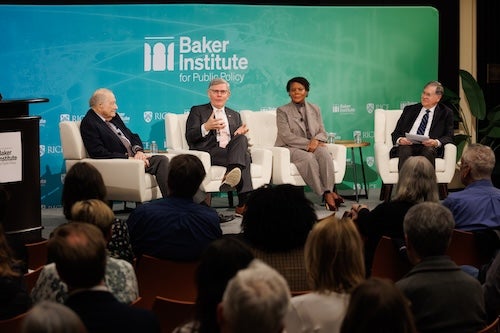Experts on American science and research policy are available to discuss how the Trump administration’s proposed budget cuts could affect the country’s citizens and global leadership.
Neal Lane, former National Science Foundation director and former science advisor to President Clinton, said American citizens will pay the price for what he calls an anti-science budget.
“The President’s deep proposed cuts in research funding, if agreed to by Congress, would set back the U.S. as a global leader in science, technology and innovation for decades. It would boost China, already ahead of the U.S. in several key fields of science and technology, allowing it to accelerate its pursuit of dominance. This anti-science, anti-progress budget is the best way I can think of to ensure that America becomes a follower, rather than a leader. And all Americans will pay the price."
Lane is currently the senior fellow in science and technology policy at Rice University’s Baker Institute for Public Policy and professor of physics and astronomy emeritus at Rice. His work has focused on the importance of American science and technology policy.
Recent policy briefs by Lane:
- Build Global Partnerships in Space for Lasting Peace and Security
- Restore America’s Leadership in Science and Technology
- Put the Science (and Education) Back in CHIPS and Science
Kirstin Matthews, director of the Baker Institute Science and Technology Policy Program, explains how the proposed budget cuts could affect the health of Americans as well as the science industry. She is also a core member of the Rice Synthetic Biology Institute and a steering committee member for Rice’s Medical Humanities Research Institute.
“Proposed cuts to science will halt a lot of research, including clinical trials, and keep new therapies and treatments in the lab and inaccessible to patients. This will impact the health and lives of millions of Americans. In addition, the cuts will disproportionately affect early-career researchers and smaller lab groups – leading young scientists to leave the field and causing the U.S. to lose a generation of researchers just when we should be encouraging more U.S. students to enter science, engineering and technology.”
Recent policy briefs by Matthews:
- Restore Vaccine Confidence for US Public and Economic Health
- Voting for Party, Not for Public Health
- Gain-of-Function Research is Vital to US Innovation
Kenneth Evans, scholar in science and technology policy and assistant director for innovation policy at Rice’s Office of Innovation, said the budget request will undo a key driver of prosperity.
"The president's budget request to Congress is shortsighted, narrow-minded and an egregious disservice to the American people. Public research funding is a key driver of economic growth and American prosperity. The country's achievements in science and innovation since World War II have driven progress and new technologies for billions of people in the U.S. and abroad. We want to ensure the United States remains a welcoming and supportive environment for students and scientists from all backgrounds and contribute to America's longstanding leadership in research and development."
Recent policy briefs by Evans:
- White House Office of Science and Technology Policy Provides In-House Science Advice for the President
- Trump and Harris Are Sharply Divided on Science, but Share Common Ground on US Technology Policy
- Ground Research Security in Science, Not Speculation

